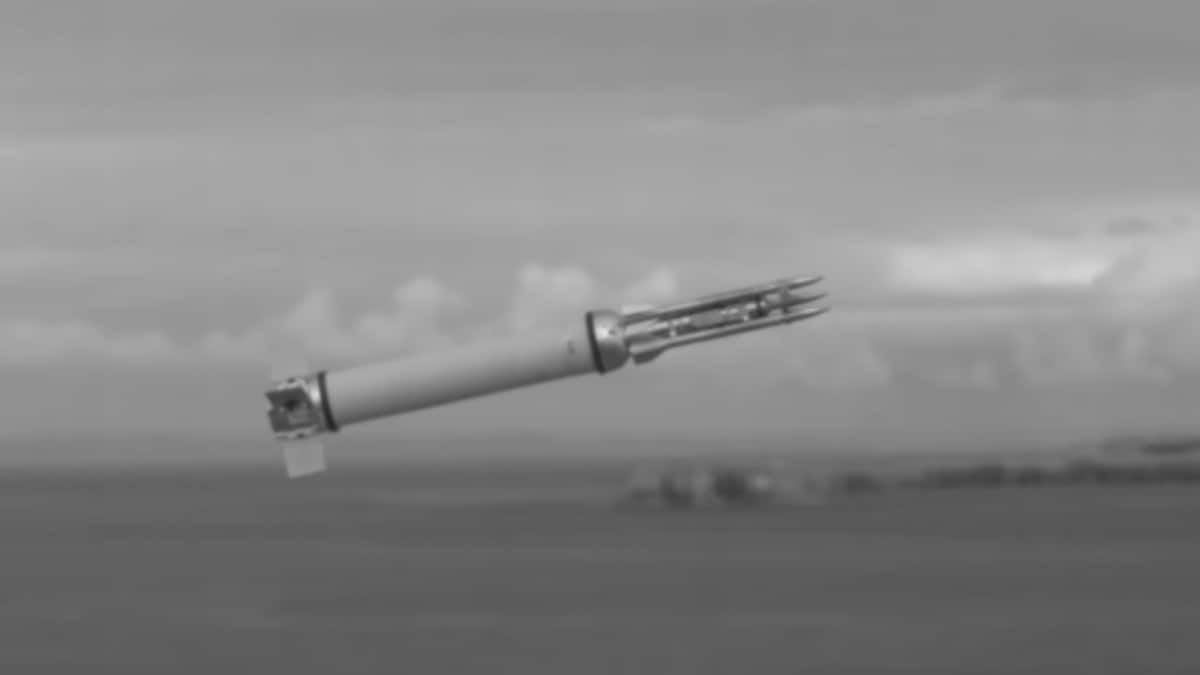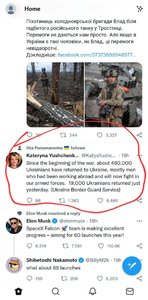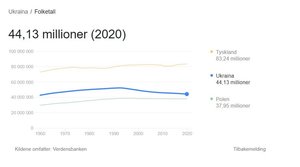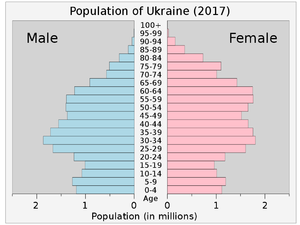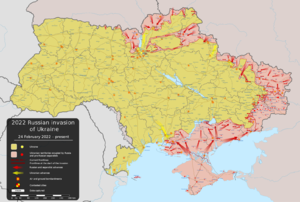Fra Financial Times idag:
‘Don’t confuse patriotism and Nazism’: Ukraine’s Azov forces face scrutiny
Nationalist regiment with neo-Nazi roots has been instrumental in the country’s resistance to Russia’s invasion
From what looked like a basement in the besieged port city of Mariupol, a deputy commander of the ultranationalist Azov Regiment, whose neo-Nazi roots have been used by Russia to justify its invasion of Ukraine, wanted to make something clear.
“You have to understand what Azov is. These are the men who, for the most part, took arms because we were attacked by Russians,” said the stocky bearded fighter, identifying himself only by his nom de guerre Kalyna, in a post on the Azov Regiment’s Telegram channel. “I ask you not to confuse the concepts of patriotism and Nazism,” he added.
The infantry unit was created in 2014 by volunteers with often far-right political leanings to fight separatists in eastern Ukraine. Now, as Russia’s invasion enters its second month, the regiment has played a prominent role in key battles in Kyiv, Kharkiv and Mariupol, as part of a nationwide resistance effort.
Andriy Biletsky, a founding commander of the Azov forces and a former MP under its splinter political wing, the National Corps, told the Financial Times by telephone from Kyiv that “they are the spine of Mariupol’s defences”, adding that there were about 1,500 Azov fighters in the city. “We are leading in the most serious battles,” he said.
Having started as a militia of just over 300 troops fighting Moscow-backed separatists, now “there are scores of thousands” of Azov fighters, said Biletsky, who in 2008 co-founded the Social-National Assembly, a grouping of the most extreme nationalist Ukrainian political parties. Most are fighting within Ukraine’s territorial defence units, including more than 1,000 in Kharkiv, he said. The interior ministry did not comment on the figures.
“Azov’s history is rooted in a volunteer battalion formed by the leadership of a neo-Nazi group. But it is certain that Azov depoliticised itself. Its history linked to the far-right movement is pretty irrelevant today,” said Anton Shekhovtsov, a Vienna-based Ukrainian expert on Russia’s connections to Europe’s far-right.
However, Taras Kuzio, a British-Ukrainian research fellow at the Henry Jackson Society think-tank, said the National Corps, while separate to Azov, has links to white supremacist groups in the US and in Europe. “In Ukraine, you have populist nationalists and you have neo-Nazis and the National Corps is the closest to something like [the latter],” he said.
Biletsky insists most Azov fighters are “patriotic, many of them are nationalists”.
“But the majority of Ukrainians today are nationalists,” he said, citing Stepan Bandera, an ultranationalist figure who collaborated with the Nazis against the Soviets during the second world war, as among the “heroes” many of his fellow citizens were now looking up to.
Andriy Biletsky, centre, founder of the Azov Regiment and the leader of splinter political party National Corps © Sergii Kharchenko/NurPhoto/Getty Images
Biletsky also pointed to the various nationalities including Israelis, Azeris, Georgians and even Russians among Azov fighters, who like to film themselves attacking the enemy and post videos on social media — blowing up Russian tanks or bundling tied-up and half-undressed Russian soldiers into a truck.
Russian president Vladmir Putin’s insistence that he invaded Ukraine to “de-Nazify” the whole country has allowed its members and supporters to shrug off the neo-Nazi label as “Russian propaganda”. Biletsky returned the accusation to Russia for being responsible for the “destruction on ethnic grounds of cities for being Ukrainian”.
Are you from Ukraine? Do you have friends and family in or from Ukraine whose lives have been upended? Or perhaps you’re doing something to help those individuals, such as fundraising or housing people in your own homes. We want to hear from you. Tell us via a short survey.
President Volodymyr Zelensky, who is Jewish, this month awarded the title of Hero of Ukraine to an Azov commander. On Monday he called Russia’s wish for the “denazification” and “demilitarisation” of Ukraine “completely incomprehensible things”.
“The way that Putin and the Kremlin use the terms ‘Nazism’ and ‘fascism’ is rooted in the Soviet era when, then and now, it means anybody who does not want to be either part of the Soviet Union or part of the Russian world,” said Kuzio.
Sergei Lavrov, Putin’s foreign minister, accused Azov troops at a shelled maternity hospital in Mariupol of “turning people into human shields . . . placing their attack equipment there and opening fire on the positions of Russian troops”. Ukrainian and US officials have denied those claims.
Alex Kovzhun, a Kyiv-based consultant who helped develop National Corps’ political programme, said the fighters were “under constant fire from Russian propaganda because Russians don’t like the idea of a Ukrainian nation”. He described the National Corps’ ideology as akin to a “European rightwing conservative party, but it is definitely not ultra-right”.
Azov is formed of historians, football hooligans and men with military experience, he said. Some were sporting “dubious tattoos” such as the Black Sun and the Wolfsangel used by the Nazis, but now claimed as pagan symbols by some battalion members, he added.
They first fought alongside a Ukrainian army which had been weakened by the pro-Kremlin presidency of Viktor Yanukovych and were incorporated into the national guard after they helped retake Mariupol in fierce battles in 2014.
In 2016, the UN documented that members of Azov embedded their troops and weapons in civilian buildings in the Donbas region. Two years later, the US state department labelled the National Corps a “nationalist hate group” and linked it to a group that “attacked” an ethnic-Roma camp in Kyiv.
The political leanings of some Azov members have never been popular. The National Corps was part of a bloc with other far-right parties that received just over 2 per cent of the vote in parliamentary elections in 2019.
But liberal Ukrainians fear that the regiment may stand to benefit politically from its battlefield prowess. “Are these the kind of fascists we want to run our country after this war is over?” asked a linguist in Kyiv.
The National Corps has “suspended political activities” because all active members had “now taken up arms or become volunteers”, said Oleksandr Alfyorov, a former spokesperson for the group.
With Azov fighters important to the war effort, its volunteers feel they are earning the support of Ukrainians who are more concerned about defending the country than political affiliations.
“Interest in our movement increased even before Russia’s open aggression,” said Serhiy Bevz, an Azov combatant in Kyiv, citing the regiment’s training of civilians in preparation for the conflict. “We are ready to defend our state from the occupiers with all our might.”
In his Telegram post Kalyna, the deputy commander, said: “Patriotism is when you defend your country and don’t attack others.” Slamming Russian warmongers, he added: “We have never tried to seize foreign lands but we have to confront the real Nazis of the 21st century. Slava Ukraini! [‘glory to Ukraine!].”



